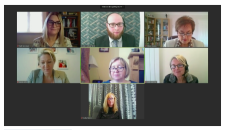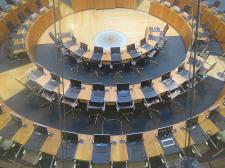
21st Century RE for All
We want every pupil to have the same entitlement to high quality, non-partisan education about religion and belief. We want to see all schools preparing young people for life in modern Britain by teaching pupils about the diversity of religious and non-religious worldviews.
We're campaigning for an end to the arbitrariness and unfairness of local determination in Religious Education and for a national religion and belief education syllabus as part of the National Curriculum.
What’s the problem?
Religious education is out of date and in need of reform. Almost thirty years after the introduction of a national curricular entitlement for all pupils, one subject remains exempt – religious education. Unlike any other compulsory subject RE is determined at a local level.
In each local authority the local agreed syllabus for religious education (RE) is determined by 'Standing Advisory Councils on Religious Education' (SACREs), largely made up of religious representatives, with non-religious representatives either excluded or barred from voting.
Even worse, many faith schools don't even need to follow the locally agreed syllabus, and can instead teach their own syllabus and teach religion from their own exclusive viewpoint.
If there is a body of knowledge called 'Religious Education', which is worthy of being taught at all, it should be offered to all children wherever they live. There are simply no grounds for discriminating on grounds of geographic location or school type. If a programme of study covering religion and belief deserves to be included in the school curriculum, it should be offered to all as a basic entitlement for every future citizen. This is simply a matter of fundamental justice and equality.
Importantly, the subject must be broad, balanced and inclusive. Religious interest groups should no longer determine what gets taught. As with other subjects, the syllabus should be nationally determined by independent educationalists without an agenda motivated by a specific religion or belief.
"The structures that underpin the local determination of the RE curriculum have failed to keep pace with changes in the wider educational world. As a result, many local authorities are struggling to fulfil their responsibility to promote high-quality religious education"
OFSTED report 'Religious Education: Realising the Potential'
Get involved
With the General Election coming up, as a nation we're thinking about our future. Please consider asking your candidate to support common sense secular reforms — such as reforming religion and belief education — that will make our society, education system, and laws fairer for all.
It’s time to take religious education in schools out of the hands of religious councils. Support a national entitlement to high quality, non-partisan education about religion and belief.
Sign the petition-
A selection of comments from the petition. Supporters on what this campaign means to them and the need to reform religion and belief education.
Find out more
NSS submission to the Commission on Religious Education
We’ve called on the Commission to support pupils’ basic entitlement to non-partisan education about religion and belief, and an end to RE controlled by religious groups or faith schools.
Religious Education and the law
RE is a statutory part of the basic curriculum in all schools, but is often shaped by local religious groups and faith schools.
Your rights: Withdrawal from RE and Collective Worship
We advocate comprehensive non-partisan reform of religion and belief education and an end to compulsory worship in schools, so no one has to withdraw from any part of the school day.
Why Religious Education must be reformed before ending parental opt-out
The right to withdraw from RE may sometimes be problematic, but is still necessary when until vestiges of confessionalism, proselytization and poor practice remain.
Standing Advisory Councils on Religious Education
Dominated by religious representatives, SACREs determine the RE syllabus at a local level.
Related news and opinion
Most Brits don’t consider religious studies important, poll finds
Posted: Thu, 3 Dec 2020 15:42
A majority of adults in Britain don't consider it important to teach religious studies at secondary school, according to a new poll.
A survey by YouGov has found that 55% of Brits think teaching RS is either "not very important" (31%) or "not at all important" (24%).
Just 12% regarded it as "very important", while 27% said it was "quite important".
The poll investigated public attitudes to 18 subjects and only three – drama, classics and Latin – gained a lower combined score in these two categories.
Meanwhile 63% thought citizenship education was either very (24%) or quite (39%) important.
The data comes amid ongoing debate over the future of education on religion and belief – particularly in Wales, where the government is planning significant reform.
The National Secular Society, which argues that education in this area should be more pluralistic and objective, said the numbers should be "a wake-up call".
NSS comment
NSS head of education Alastair Lichten said: "These findings are just the latest sign that religion and belief education needs significant reform to gain public confidence.
"Policy makers should be prepared to confront the dominance of religious interests and instead adopt an approach where a broader range of worldviews is critically considered."
Current moves towards reform
- Earlier this year the Welsh government published legislation to replace religious education (RE) with a more pluralistic subject, called Religion, Values and Ethics.
- In 2018 a report from the Commission on Religious Education recommended replacing RE with 'Religion and Worldviews' and introducing a national entitlement to it in England.
Further notes
- The YouGov poll didn't distinguish between RE and RS.
- YouGov surveyed 1,645 adults between 21 and 23 November 2020. The poll was highlighted in the November edition of the Counting Religion in Britain blog.
NSS gives evidence to Senedd committee over Welsh curriculum reform
Posted: Fri, 16 Oct 2020 09:52
The National Secular Society has called for children's rights to be prioritised over religious interests in the formulation of a new curriculum for Wales in evidence to the Senedd.
The NSS's head of education Alastair Lichten made the call as he gave evidence to the Senedd's children, young people and education committee on Thursday, alongside representatives from Humanists UK.
The committee is currently considering legislation for a new curriculum for Wales, which is set to replace religious education with a new subject – religion, values and ethics (RVE).
The plans would continue to allow faith schools to teach the subject from a religious perspective, though they will be required to offer a pluralistic RVE course where parents request it.
Mr Lichten welcomed the ambition behind the proposals but warned that concessions to faith groups risked undermining the attempt to fulfil it.
"The ambition that all children in Wales have access to critical, pluralistic RVE was a really important and positive part of the new curriculum project. It's concerning and sad to see any effort to water that down.
"If we start from a child's rights perspective, rather than religious interests or the faith schools lobby's preferences, then it's very hard to justify children not having that entitlement."
Elsewhere he:
- Commented on the potential removal of parents' right to withdraw their children from RVE. He said this would be likely to be subject to a legal challenge if RVE was still taught through a religious lens to families who did not want that.
- Criticised the continuation of SACREs – bodies which determine RE curricula at a local level – and the failure to consider the requirement to hold collective worship as part of the new curriculum.
- Expressed support for plans to introduce comprehensive, rights-based relationships and sexuality education (RSE), but also voiced concerns over faith schools' ability to teach the subject through a religious lens.
- Said it was "insulting" to LGBT pupils, non-religious pupils or pupils from LGBT and non-religious families to suggest some schools could opt out of mentioning issues relevant to them in the curriculum.
The NSS is lobbying the Welsh government in an attempt to ensure its religion, values and ethics curriculum is genuinely pluralistic and balanced.
The society is urging supporters in Wales to write to their Senedd members over the proposals.
- Watch the evidence in full (starts after 1 hour 26 minutes).
- Transcript of evidence sessions
Image: Witnesses before the committee's session on Thursday. Alastair Lichten is at the top, in the centre.
NSS urges Senedd to back curriculum reforms
Posted: Fri, 25 Sep 2020 10:07
The National Secular Society has urged a Senedd education committee to back new legislation to reform religious studies and sex education in Wales.
The NSS's call came in response to a call for evidence from the children, young people and education committee of the Welsh Senedd which is examining the Curriculum and Assessment (Wales) Bill. The NSS is due to give evidence to the committee in October.
Among wide ranging changes, the legislation will introduce comprehensive, rights-based Relationships and Sexuality Education (RSE) and the option for critical, pluralistic Religion, Values and Ethics (RVE) in all schools.
The Welsh government says the reforms are intended to give "all learners equal opportunity to receive a broad and balanced education".
Plans don't go far enough
While supporting these aims, the NSS has criticised plans to allow faith schools to continue to teach these subjects through a faith ethos.
The submission argues that under current proposals, many pupils will continue to be denied access to genuinely non-partisan and balanced education about religion and belief.
It calls on the committee to push for the duty on schools to teach pluralistic RVE to be extended to all schools, regardless of religious designation.
Although schools with a religious designation will be free to teach a denominational syllabus, they will however be required to offer a pluralistic RVE syllabus, where parents request it.
The Catholic Church is lobbying Senedd members to remove this requirement.
The submission also warns that plans to introduce inclusive, comprehensive, accurate and rights based RSE will be undermined by concessions allowing faith schools to teach RSE through a religious ethos.
'Advancement for children's rights'
NSS head of education Alastair Lichten said: "By prioritising the interests of children and young people over those of reactionary religious groups, members of the Senedd can ensure these reforms are a significant advancement for children's rights.
"If the ambition is for every child to have universal entitlement to a broad and balanced curriculum, a duty on all schools to teach an objective, critical, and pluralistic RVE and RSE syllabus, without exception, must be the starting point.
"Much of the existing legislation surrounding the curriculum dates from before devolution and reflects English policy makers' religious deference. A curriculum for Wales in the 21st century requires legislation crafted in Wales, by its elected representatives in this century."
Notes
The NSS has been actively engaged in discussions regarding the new curriculum and has played a key role in ensuring that secularism will be included among the core concepts to be covered.
The NSS has previously submitted constructive responses to all consultations the surrounding the reforms, including:
- Legislative proposals for religion, values and ethics in the Curriculum for Wales Framework
- Ensuring access to the full curriculum
- A transformational curriculum – proposals for a new legislative framework
- Draft guidance on relationships and sexuality education
The committee's consultation runs until Tuesday 29 September. You can find more information on this consultation and the RVE proposals on our dedicated campaign page.
Listen to our recent podcast on the issue
Give every child a pluralistic education, NSS tells Welsh government
Posted: Tue, 28 Jul 2020 13:58
The National Secular Society has urged the Welsh government to extend planned reforms of religious education so every child is given a pluralistic and balanced syllabus.
The Welsh government plans to replace RE with a new subject, religion, values and ethics (RVE), which will emphasise the diversity of both religious and non-religious worldviews.
Faith schools will be required to offer pluralistic RVE as an option where parents request it, but will otherwise be allowed to continue to teach the subject from a religious perspective.
NSS consultation response
In response to a consultation on the plans, which closes today, the NSS welcomed the government's efforts to make the subject more pluralistic.
But it urged ministers to ensure all children would receive a critically-informed RVE syllabus.
"We deeply regret that by permitting faith schools to continue to use the subject to promote their particular religious outlook through the denominational syllabus, many pupils in Wales will continue to be denied access to genuinely non-partisan and balanced education about the full range of religious and non-religious worldviews.
"This should be the right of every child, irrespective of the type of school they attend."
The NSS's response also said:
- Making pluralistic RVE an option rather than the standard in faith schools would "introduce additional burdens" and "create confusion" while disregarding pupils' independent rights.
- The government should pause plans to remove the parental right to withdraw children from RVE until the new curriculum could be assessed, particularly given concerns around the teaching of RVE in faith schools.
- The delivery of RVE could be subject to a legal challenge where it was not "objective, critical, and pluralistic" if the right to withdraw was removed.
- Schools should not be treated as "homogenous faith communities", particularly given evidence that families largely do not choose faith schools based on their religious character.
NSS comment
NSS head of education Alastair Lichten said the Welsh government's approach was "broadly welcome" but warned that ministers risked "missing a significant opportunity".
"The government's recognition of the need for change is welcome. But its plans still give too much ground to religious interests. This means state-funded schools will continue to be used to push particular religious worldviews on children, at the expense of their right to a broad and balanced education.
"Wales has the chance to lead the way on the teaching of religion and belief across the UK by ensuring every child is taught in a genuinely pluralistic, balanced and critically-informed way. Ministers should take it."
The Welsh government published a bill outlining its plans earlier this month. The NSS has lobbied ministers throughout the process of drafting the legislation.
Catholic leaders' opposition to reform
Last month Catholic school leaders wrote to Wales's first minister to oppose the planned reforms, in a move backed by the Catholic Education Service (CES). The NSS has since urged the minister to reject their "special pleading".
In its consultation response the NSS also noted that the CES's own data had found that just 54% of pupils in maintained Catholic schools and colleges in Wales were Catholic.
You can read more about the NSS's position on the proposals and how you can help us make our case on our dedicated campaign page.
Image: © Lucélia Ribeiro, via Flickr [CC BY-SA 2.0]
Overhaul of RE in Wales begins with new bill
Posted: Thu, 9 Jul 2020 09:02
The Welsh Government has published legislation to replace religious education (RE) with a more pluralistic 'religion, values and ethics' (RVE) subject.
The Curriculum and Assessment (Wales) Bill was introduced to the Senedd by education minister Kirsty Williams on Tuesday, as part of wider education reforms. Under the proposals, all schools in Wales will be required to provide RVE based on locally agreed syllabi, which will themselves be based on a new national curriculum – with an emphasis on the diversity of religious and nonreligious worldviews.
An explanatory note published along with the draft bill reiterates the explicit intention of RVE to ensure learners "explore worldviews that include religions and other beliefs, and the impact these have on them and others in societies" – with "secularism" listed among the core concepts to be covered.
However, many faith schools will only be required to offer pluralistic RVE as an option where requested by parents – and will still be permitted continue to teach the subject from a faith perspective "in accordance with tenets of its religion or denomination."
The Catholic Education Service is lobbying against the requirement for faith schools to offer a pluralistic model of RVE.
The draft bill also removes the longstanding parental right of withdrawal.
The National Secular Society's Head of education, Alastair Lichten, welcomed the publication of the bill:
"This historic legislation could make Wales the UK's leading nation when it comes to inclusive and critical education about worldviews and their impact on society. Regrettably, the government's own ambitions will be undermined by the special exemptions for faith schools, which will mean many pupils will not have full access to pluralistic RVE.
"We will continue to work with ministers and Senedd members to improve the legislation and ensure that this once in a generation opportunity for reform is not undermined by the privileging of religion."
Although supportive of the intentions of the bill, the NSS has been critical of plans to retain the role of SACREs (standing advisory councils on religious education) and ASCs (agreed syllabus conferences) in producing the agreed syllabus for their area. Existing legislation will be amended to permit the appointment of representatives of nonreligious beliefs, but NSS has argued for a nationally agreed syllabus determined by educational experts, rather than special-interest groups.
The NSS has created a dedicated campaign page with a full briefing on the proposals and links for supporters to write to their Senedd members or respond to the consultation directly.
The page also includes a link to a survey of supporters' views on the future of RE reform and on the right to withdraw.
Image by Lesbardd - Own work, CC BY-SA 4.0, Wikimedia.
For RE news stories click here.







